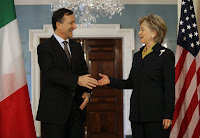Fourty-five Days into the Obama presidency, the US is undergoing a major, overdue, foreign policy repositioning. While this is a welcome development, it baffles to observe the zeal with wihich all of the Western allies of the US, which until two months ago were staunchly and convincedly supporting the albinistic policies of the Bush administration, are rushing to shift gears and signal as well as put into practice similar policy turnabouts.
There is something grotesque in the way such leaders strive to impress the new strong-man in Washington to secure a little place in the sun. In spite of arguments about the declining hegemony of the US, this is a clear indication of the power relations still prevailing within the Western coalition, where client leaders scuffle to become the new Poodle-in-Charge.
This shows that the ideal of an independent and self reliant foreign policy is nothing more than an ideal, and so much for national sovereignty. It also shows the importance of ideology to international politics, this truly the neglected variable in the scientific study of international relations. If state behaviour can change so dramaticaly from night to day, there must be factors other than rationality and material interests animating the actions of states.
Therefore, when the US calls, the poodles bark! Look at Iran: we can now talk to the ayatollahs; look at Iraq: we are pulling out; look at Afghanistan: we need to talk to the neighbours; look at China: we can work with them. And all of the conservative poodles go along wagging their tails. For example, consider: 

Italy: after announcing a visit to Iran, to facilitate a rapprochement between the West and that country, in the hope of gaining new credit in Washington after the memorable gaffe of wise-man Silvio Berlusconi, the foreign ministry rushed to cancel a visit of Minister Frattini to Iran. This  came as a 'mindful' response to Hillary Clinton's blasting on Iran (La Repubbica, 06. 03. 2009). The irony is that the next day Clinton reinstated the Administration's policy of engagement.
came as a 'mindful' response to Hillary Clinton's blasting on Iran (La Repubbica, 06. 03. 2009). The irony is that the next day Clinton reinstated the Administration's policy of engagement.
Canada: Whereas PM Stephen Harper has so far pointedly refused to appoint a Special Envoy for Afghanistan, after a meeting with NATO foreign ministers in Brussels, Mr. Cannon said he will raise the issue with the PM, to bring Canada in line with the coalition's preferences as initiated by the US wit their own appontment of Richard Holbrooke (Globe & Mail, 06. 03. 2009).
Brussels, Mr. Cannon said he will raise the issue with the PM, to bring Canada in line with the coalition's preferences as initiated by the US wit their own appontment of Richard Holbrooke (Globe & Mail, 06. 03. 2009).
 came as a 'mindful' response to Hillary Clinton's blasting on Iran (La Repubbica, 06. 03. 2009). The irony is that the next day Clinton reinstated the Administration's policy of engagement.
came as a 'mindful' response to Hillary Clinton's blasting on Iran (La Repubbica, 06. 03. 2009). The irony is that the next day Clinton reinstated the Administration's policy of engagement.Canada: Whereas PM Stephen Harper has so far pointedly refused to appoint a Special Envoy for Afghanistan, after a meeting with NATO foreign ministers in
 Brussels, Mr. Cannon said he will raise the issue with the PM, to bring Canada in line with the coalition's preferences as initiated by the US wit their own appontment of Richard Holbrooke (Globe & Mail, 06. 03. 2009).
Brussels, Mr. Cannon said he will raise the issue with the PM, to bring Canada in line with the coalition's preferences as initiated by the US wit their own appontment of Richard Holbrooke (Globe & Mail, 06. 03. 2009).The UK, at least, preserved the elegance of the form: you must lead! Gordon Brown pronounced to a joint session of the US Congress (CBC, 05. 03. 2009).
But a little coherence would avoid the need for such embarassing somersaults.

No comments:
Post a Comment